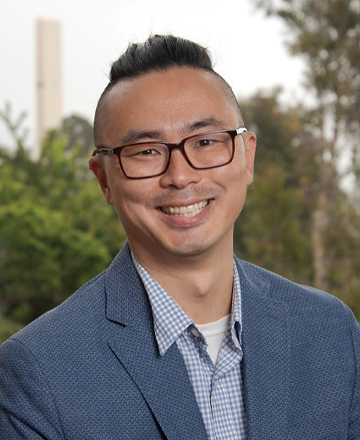Adoption and Faith: Trusting God with Unresolvable Questions
My Christian faith has given me the strength to ask unresolvable questions

Zachary Luben, Director of Graduate Student Ministries
In February of 1983, at 8 months old, I flew from Seoul, South Korea, to Los Angeles where I was given to a couple whom I call mom and dad. I am an intercountry and transracial adoptee. Intercountry refers to being born in Korea and adopted into the US. Transracial refers to being adopted into a different race; my parents and older brother are white. I was the first but not the last child my parents would adopt. My younger sister and brother are also Korean American adoptees.
My parents’ deep Christian faith led them to consider adoption, and their church community helped support them spiritually, emotionally, and financially in my adoption. My name, Zachary, means “God remembers,” and it was given to me because my parents believed that God remembered me in Korea and remembered their desire to have a larger family. From the very beginning, God and the Christian faith have been and continue to be integral to my story. My faith has given me the strength to ask difficult questions.
My life is full of questions, and I am learning to live with the idea that many of them do not and will not have answers. I do not know much about my birth parents. I have never seen a photo of them. I wonder who they are. If I look more like my birth mom or birth dad. If I have biological siblings. As violence against Asians increased during the height of the COVID-19 pandemic, I found myself asking what it means to be Korean, American, and, particularly, a Korean American adoptee.
These are hard questions, and at times I have been afraid to ask them—or I’ve been afraid to pursue their answers. It is not uncommon for adoptees to delay searching for their birth parents in fear of hurting and disrupting their adoptive families. This was true for me in my late 20s. Asking questions about identity may lead to rejection, which is already something many adoptees feel. Perhaps the greatest fear is that pursuing these kinds of questions will not lead to resolution but more questions.
In 2021 I initiated a search for my birth mother. I wrote a letter, included some photos, and sent it off not knowing when or if I would hear anything. A couple of weeks before Christmas, my adoption agency notified me that they had found her. Sadly, she had died in 1984, and they could not tell me more beyond that. I had overcome my fear and received an answer, but it only led me to more questions. What did she die from? Where is she buried? What was her life like those two years between giving birth to me and dying?
My Christian faith has helped me learn to live with the unknown and has given me the strength to ask unresolvable questions. My identity in Christ is my foundation to explore the questions that arise from my adoption when it comes to my identity. I have often encountered people who think one’s identity in Christ trumps all other identity questions. My experience has been the opposite—my identity in Christ has freed me to explore the difficult identity questions of being an adoptee. My trust in the Good News of Jesus allows me to overcome my fear and keep asking questions. My faith in God gives me the strength to live without knowing all the answers.
